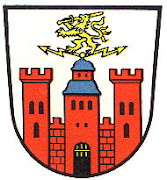April 21Fred Leis-
So, I left Pirmasens, my hometown, in 1956.
- ....see previous blog article ....I sent a copy of my lament to a few people...but did not expect any comments...people are busy...
-
-
Sehr geehrter Herr Leis,
vielen Dank für Ihre Nachricht.
Seit Ihrem letzten Besuch in Pirmasens hat sich doch Einiges in Pirmasens getan.
Die Konversion (Abzug der US Streitkräfte und wie von Ihnen zutreffend geschildert, Niedergang der Schuhindustrie) haben die Stadt vor große Probleme gestellt.
Die Stadt musste einen Bevölkerungsrückgang von 60.000 auf 40.000 Einwohner verkraften.
Als positive Entwicklungen darf ich Ihnen beispielhaft die Entwicklung der Husterhöhe (Fachhochschule, Prüf- und Forschungsinstitut, Ansiedlung von Unternehmen, die rd. 2300 neue, technisch qualifizierte Arbeitsplätze geschaffen haben z.B. Convar) nennen.
Auch im Bereich Infrastruktur konnten 63 neue Straßen durch das vor 10 Jahren eingeführte System der wiederkehrenden Beiträge ausgebaut und erneuert werden.
Die ehemalige Schuhfabrik Rheinberger beheimatet heute ein Wissenschaftsmuseum, das Dynamikum und zahlreiche Dienstleister. Der Strecktalpark wurde als Naherholungszentrum angelegt. Der Umbau der alten Post zum modernen Museums- und Kulturzentrum wird bald abgeschlossen sein.
Der Bau einer Einkaufsgalerie im Bereich der Fußgängerzone/Bahnhofstraße ist zur Zeit in Planung.
Die hohe Schuldenlast, bedingt durch die von Bund und Land auferlegten sozialen Leistungspflichten (Kosten der Unterkunft) soll in den kommenden 15 Jahren durch Einsparungen im Rahmen des sog. "Entschuldungsfonds" im Bereich der Liquiditätskredite abgebaut werden.
Der "Pakt für Pirmasens" wurde ins Leben gerufen, um insbesondere sozial benachteiligte Kinder und Jugendliche durch Spenden finanzierte Fördermaßnahmen zu unterstützen.
-
-
Dear Susanne Krekeler: I want to thank you for your kind and informative note, a response to a general Zettelkasten-pruduction which I apparently, unsolicited sent to you. I will, if that's okay with you post your wonderful and beautifully constructed letter on my Pirmasens blog.I am pleased and happy to learn that things are improving in Pirmasens and I'm glad to learn that there are people like you who care.Best Regards, Fred Leis ( Manfred Leis) einst von Pirmasens
-
-
Hallo Herr Leis,
meine Nachricht können Sie natürlich gerne für Ihren Blog verwenden.
Schöne Grüße
Susanne Krekeler
-






